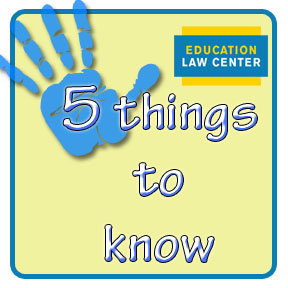Equal Access
Fair School Funding
Equal Access
Equal Access
-
Book bans are on the rise across the nation, and Pennsylvania ranks third among the states in terms of most books banned. Book bans not only deprive students of important learning opportunities; they directly undermine student self-esteem, further erase historically marginalized identities, and treat students of color and students who identify as LBGTQ+ as inferior and unwelcome.
Read our statement urging school boards to uphold the First Amendment and reject policies that unlawfully remove books from school libraries.
-
Act 1: New Tools to Support Students Experiencing Educational Instability
Pennsylvania students who experience “education instability” due to homelessness, involvement in the foster care or juvenile justice systems, or court-ordered placements, are entitled to additional support under a new law called Act 1 of 2022. This law seeks to remove educational and graduation barriers for students who experience one or more school changes during a single school year. These students are often unable to fully participate in school and are unable to graduate on time due to lost or unrecognized credits or a student’s inability to take a course required by their last school.
Learn more about students’ rights under Act 1 in an Education Law Center fact sheet here and review the Pennsylvania Department of Education’s interim guidance on Act 1 here. You can also view a recorded webinar on implementing Act 1 co-produced by ELC and Juvenile Law Center.
If a student you are working with has experienced education instability, you can use the tools below to advocate on the student’s behalf:
Request Assignment of a Point of Contact: Under Act 1, students are assigned a Point-of-Conduct designated by the school the student currently attends. This Point of Contact ensures that all students are able to fully participate in school activities and provides additional support for high school students, including assessing credits, considering whether certain credits may be waived, and developing an individualized Graduation Plan. Use this tool if the student has not been assigned a Point of Contact.
Request Credit Assessment and/or Graduation Plan: High school students receive special support under Act 1. These students must receive a credit assessment, a process through which a school must now award full or partial credit for all work satisfactorily completed in a prior school, including a residential placement. A current school can also waive credit requirements that pose a barrier to graduation for students. In addition, a Point of Contact must develop an individualized graduation plan for students who experience education instability.
If a student is unable to graduate through their current school, a Point of Contact can request a diploma from the prior school. A student may receive a diploma from their prior school if deemed ineligible to graduate from their current school following a credit and waiver assessment and the student meets the prior school’s graduation requirements after the assessment. Beginning in the 2022-2023 school year, students can also receive a state-wide Keystone Diploma. This option is only explored if a student cannot graduate from their current or prior school. A Keystone Diploma has the same force as a school-issued high school diploma and is not the same as a GED. Use this tool to request a credit assessment, credit waiver, graduation plan, or related request.
Request for Act 1 Graduation Support Retroactive to School Year 2021-2022: Act 1 eligible high school students are entitled to support to ensure that they can graduate on time. If a student was not identified during the 2021-2022 school year or was identified and was not provided with a pathway to on-time graduation, the school that the student last attended can identify a pathway to graduation during the 2022-2023 school year and issue a diploma retroactive to the 2021-2022 school year without requiring the student to complete additional work or attend classes.
These students can also be graduated from a prior school, if graduating from the school they last attended is not possible. As a last resort, if a student cannot graduate from the school they last attended or a prior school, they are eligible for support to apply for a statewide Keystone diploma. A Keystone diploma has the same force as a school-issued high school diploma and is not a GED. Use this tool if the student was not identified or offered a path to on-time graduation last year.
Request to Participate in a School-Sponsored Activity or Extracurricular: Under Act 1, students who change schools mid-year must be allowed to participate in school-sponsored activities and extracurriculars if they meet “participation and qualification requirements.” Use this tool if the student is being denied the ability to participate in a school-sponsored activity or extracurricular.
Request to Eliminate Fines or Fees: Students protected by Act 1 cannot be assessed fees or fines to participate in a school-sponsored activity or extracurricular or as a penalty for not having a uniform. Such fees must be waived. Use this tool if the student is subject to a dress code fine or denied the ability to participate in a school-sponsored activity or extracurricular due to a fee.
-
COVID-19 school closures have had an impact on students with disabilities. ELC compiled this resource of 5 important things for students with disabilities and their families to know.
5 Things Students with Disabilities Should Know
Equal Access
School to Prison Pipeline
-
In January 2022, the Pennsylvania General Assembly enacted Act 1 of 2022 (Act 1) (24 P.S. § 13-1331.1), which seeks to remove educational and graduation barriers for students who experience “education instability” due to homelessness, foster care, involvement in the juvenile justice, or court-ordered placements. Act 1 of 2022 seeks to address these barriers and promote timely high school graduation and equal access to school engagement for these students.
You can learn more here.
